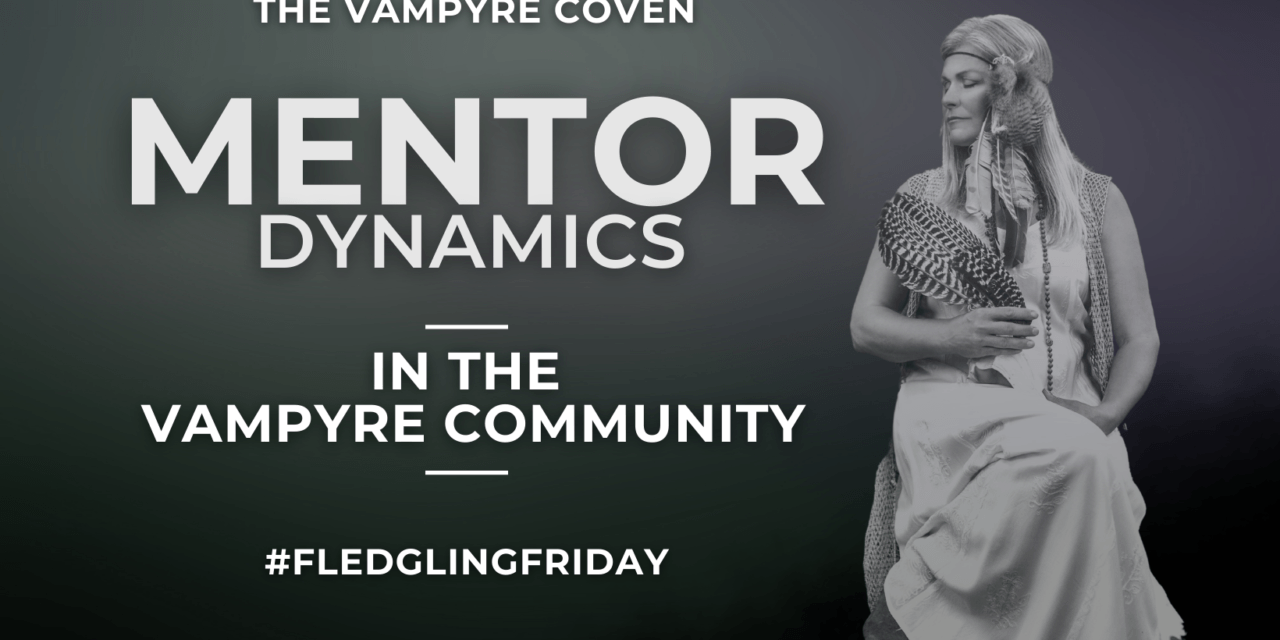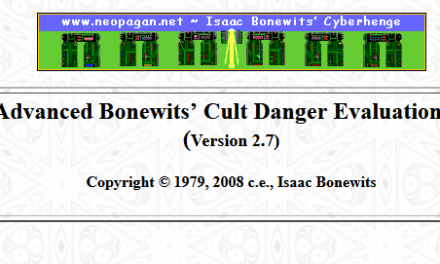Mentorship in the occult & vampyre community (and anywhere else for that matter)
One of the biggest mistakes I see people make when they first come into the vampyre community is their tactics in the pursuit of a mentor. Countless times over the years I have seen people brand new to a group say “I’m looking for a mentor. If anyone would like to mentor me, please hit me up.”
First, you should be seeking out a qualified mentor if that’s what your goal is. In no other place is it appropriate to seek out a mentor without vetting them, without checking their qualifications, without seeing if you agree with their worldview.
Second, it is insanely dangerous to take the word of a random person as guidance. When you cold call for mentors you’re opening yourself up to anyone coming to you and pretending they have knowledge and power so they can take advantage of you. This happens, OFTEN.
Finding a good mentor is not an easy task
It doesn’t happen overnight. Some people never find a good mentor. You don’t need a mentor at all, honestly… but they’re nice to have. So, equipping yourself with some knowledge on what to look for in a mentor and how to go about it can help you greatly on your quest.
Know what you want and what you are looking for in a mentor
Having a clear picture of what you’re looking for will help you choose the right person for the job.
-
Make sure they have relevant knowledge and experience – you’d be surprised how many people pretend to have knowledge, experience, and power that they truly do not have. Can they prove their experience? Do they have real people who back up their claims?
-
Make sure they’re willing to impart their knowledge – Do they have the knowledge that they claim to have? Are they going to actually give that knowledge to you? What do they expect you to do to gain that knowledge?
-
Make sure they have the ability to give & take honest feedback – Not only should they be able to give constructive criticism but they should also be able to hear it from you as well. Constructive** being the key word here. It should never be insulting.
-
Make sure they’re empathetic – not an empath, but capable of relating to you as a person
-
Make sure they have a passion for the community/skills you want to grow in – Is their passion in the right places?
Knowing what you want out of a mentor is also important.
-
Knowing exactly what you want to learn is key. “Teach me about vampyres” is extremely vague. A potential mentor will respond much better to questions they can actually answer or specific topics they can explain without taking a year to do it. Make a list of specific things you want to know more about so a mentor can help guide you through those topics. It shows you’ve done some of the work on your own as well which a potential mentor will want to see.
-
Know what perspective you wish to learn from. Are you looking for a satanic or LHP perspective? How about the perspective of a witch? Do you work with gods, goddesses, demons, etc? Are you not spiritual at all? Are you looking for sanguine info? Psy info? This is key to figuring out a mentor who aligns with the proper perspective for you to learn from. You may even want to find mentors from perspectives you don’t have so you can broaden your worldview. It depends on what part of your journey you’re on.
Establishing a Relationship with a potential mentor
While there is no single way to handle establishing a relationship with a mentor… I will say that establishing a relationship with someone prior to even mentioning a mentorship is the way to go. Say hello to them, have a conversation. Interact with them in groups and vibe with them as a person. You can learn a lot about someone based on how they interact with you when there’s no expectations in place. You may also find that this person who you’re seeking mentorship from may not have the mental bandwidth to handle a mentor/mentee dynamic right now. Regardless, you will have a better outcome getting to know someone first before asking them to be a mentor. They’ll be more receptive to it as it feels less transactional. Nobody wants to feel like they’re just a tool to further your practice, so don’t treat them as such.
Boundaries are major!
Mentor/mentee relationships require boundaries that need to be respected. Mentors are not your therapists. Mentors are not there to be available for you 24/7. Mentors are not there to do the work for you. The job of the mentor is not to drop every little nugget of knowledge they have on you so that you don’t have to do the work. 9.8 times out of 10 there should not be romantic feelings involved in a Mentor/Mentee dynamic. It almost never ends well… If a formal mentor/mentee agreement is created, an opt-out agreement should be discussed so that both parties know what can cause the relationship to end and how it will end if that time comes.
Be Realistic
Mentor relationships should be built up the way any lasting relationship is. It starts slow and it builds up. You have to build rapport with a potential mentor to make them comfortable taking you on as a mentee.
There are a LOT of red flags you should look out for when seeking a potential mentor.
-
 If a potential mentor is very eager to take you on quickly as a student, chances are they have ulterior motives or aren’t as experienced as they seem.
If a potential mentor is very eager to take you on quickly as a student, chances are they have ulterior motives or aren’t as experienced as they seem. 
-
 If you feel uncomfortable with them or around them or their words or actions make you uncomfortable, that’s a bad sign.
If you feel uncomfortable with them or around them or their words or actions make you uncomfortable, that’s a bad sign. 
-
 If you feel things moving in a romantic direction, beware. If you are the one with the romantic feelings, think long and hard about whether it’s worth pursuing.*
If you feel things moving in a romantic direction, beware. If you are the one with the romantic feelings, think long and hard about whether it’s worth pursuing.* 
-
 If they make unreasonable demands of you or their other mentees, including unwanted sexual advances, leave the situation.
If they make unreasonable demands of you or their other mentees, including unwanted sexual advances, leave the situation. 


-
 If the dynamic feels unnecessarily competitive, you’ve probably plateaued with them and learned what you can. They are probably engaging in competition because they feel threatened.
If the dynamic feels unnecessarily competitive, you’ve probably plateaued with them and learned what you can. They are probably engaging in competition because they feel threatened. 
-
 If you feel demeaned, disrespected, or unjustly punished… that is toxic
If you feel demeaned, disrespected, or unjustly punished… that is toxic 
-
 If you feel like you’re being forced to believe something you don’t vibe with, that is cult mentality.
If you feel like you’re being forced to believe something you don’t vibe with, that is cult mentality. 
-
 If you feel like you’re being forced to do *anything* – that is a consent violation, you shouldn’t tolerate that.
If you feel like you’re being forced to do *anything* – that is a consent violation, you shouldn’t tolerate that. 
Of course, Mentors are human and there should be flexibility for human error. You’re gonna fight with people you care about once in a while. The key is for there to be maturity to handle the situation, learn from it, and move past it when it does happen.
*Relationships can and do happen between mentor/mentee but this dynamic is abused regularly. You need to make a discerning decision about whether to pursue a relationship with a mentor and really contemplate whether or not they’ve dated their mentees before… is this habitual? is this a way this person preys on their students for personal satisfaction? When the relationship goes south, will you be ready to lose the mentor dynamic and probably be shunned from the family dynamic you’ve cultivated in the group you’re in? Is it worth it?
Never rush into these situations and always feel them out. Mentors who are worth a damn will allow you to peer inside their world without commitment at first. Most offer probationary statuses within their organizations to allow you time to see if it’s a good fit for you.
Mentor Green Flags
-
 They are an active listener. They ask questions about what you’re talking about and experiencing.
They are an active listener. They ask questions about what you’re talking about and experiencing.
-
 They offer wisdom through sharing their own experiences and allow you to come to your own conclusions.
They offer wisdom through sharing their own experiences and allow you to come to your own conclusions.
-
 You have a relaxed, comfortable, and pleasant dynamic with your mentor.
You have a relaxed, comfortable, and pleasant dynamic with your mentor.
-
 You feel inspired and empowered by your mentor.
You feel inspired and empowered by your mentor.
-
 The dynamic is helpful and you look forward to your time with them.
The dynamic is helpful and you look forward to your time with them.
-
 They make an effort to introduce you to people who can further your journey when applicable.
They make an effort to introduce you to people who can further your journey when applicable.
The whole point of mentorship is for you to learn how to listen to yourself rather than become reliant on what your mentor has to say. You’re there to learn from them, not become dependent on them.
Why are all the Mentors so damn salty?
The thing about good mentors is that they’re often not super open to taking on students. Why? Because they’re tired of being used and abused by students. By opening themselves to newcomers they open themselves to being hurt by them. Mentors have been known to put a lot of time and energy into students just for the student to turn around and stab them in the back somehow or drop them when things get tough. Mentors who have been around for a while build walls up to prevent themselves from having to go through that over and over. Not to mention the near constant barrage of idiots that come and go, it really starts to get annoying after so many years. So, there is an unfortunate amount of people who could be mentors in the community who end up being rude to community newbies. It’s a big problem around here… trust me, I know. But put yourself in their shoes for a moment and try to understand… If you put a little time into having real intelligent conversations with these people without expectations of something in return, you’ll get pretty far.
Okay, what’s the point?
Moral of the story is that it takes time and effort to find teachers and mentors. Don’t go out seeking them with a wanted ad. Take your time exploring the community on your own and discerning who out there seems like they’ve got a good head on their shoulders and strike up a conversation with them.
If nothing else, you’ve got this group. There’s some very knowledgeable people here and we are always open to discussing things! If you’re anxious about asking a question, ask it through an anonymous post! We’re here to help and guide you if we can. 


 If a potential mentor is very eager to take you on quickly as a student, chances are they have ulterior motives or aren’t as experienced as they seem.
If a potential mentor is very eager to take you on quickly as a student, chances are they have ulterior motives or aren’t as experienced as they seem. 
 If you feel uncomfortable with them or around them or their words or actions make you uncomfortable, that’s a bad sign.
If you feel uncomfortable with them or around them or their words or actions make you uncomfortable, that’s a bad sign. 
 If you feel things moving in a romantic direction, beware. If you are the one with the romantic feelings, think long and hard about whether it’s worth pursuing.*
If you feel things moving in a romantic direction, beware. If you are the one with the romantic feelings, think long and hard about whether it’s worth pursuing.* 
 If they make unreasonable demands of you or their other mentees, including unwanted sexual advances, leave the situation.
If they make unreasonable demands of you or their other mentees, including unwanted sexual advances, leave the situation. 


 If the dynamic feels unnecessarily competitive, you’ve probably plateaued with them and learned what you can. They are probably engaging in competition because they feel threatened.
If the dynamic feels unnecessarily competitive, you’ve probably plateaued with them and learned what you can. They are probably engaging in competition because they feel threatened. 
 If you feel demeaned, disrespected, or unjustly punished… that is toxic
If you feel demeaned, disrespected, or unjustly punished… that is toxic 
 If you feel like you’re being forced to believe something you don’t vibe with, that is cult mentality.
If you feel like you’re being forced to believe something you don’t vibe with, that is cult mentality. 
 If you feel like you’re being forced to do *anything* – that is a consent violation, you shouldn’t tolerate that.
If you feel like you’re being forced to do *anything* – that is a consent violation, you shouldn’t tolerate that. 
 They are an active listener. They ask questions about what you’re talking about and experiencing.
They are an active listener. They ask questions about what you’re talking about and experiencing. They offer wisdom through sharing their own experiences and allow you to come to your own conclusions.
They offer wisdom through sharing their own experiences and allow you to come to your own conclusions. You have a relaxed, comfortable, and pleasant dynamic with your mentor.
You have a relaxed, comfortable, and pleasant dynamic with your mentor. You feel inspired and empowered by your mentor.
You feel inspired and empowered by your mentor. The dynamic is helpful and you look forward to your time with them.
The dynamic is helpful and you look forward to your time with them. They make an effort to introduce you to people who can further your journey when applicable.
They make an effort to introduce you to people who can further your journey when applicable.![]()
![]()















Recent Comments